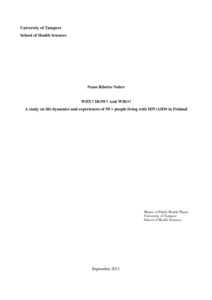WHY? HOW? And WHO? A study on life dynamics and experiences of 50 + people living with HIV/AIDS in Finland
RIBEIRO NOBRE, NUNO (2011)
RIBEIRO NOBRE, NUNO
2011
Kansanterveystiede - Public Health
Terveystieteiden yksikkö - School of Health Sciences
This publication is copyrighted. You may download, display and print it for Your own personal use. Commercial use is prohibited.
Hyväksymispäivämäärä
2011-10-20
Julkaisun pysyvä osoite on
https://urn.fi/urn:nbn:fi:uta-1-21856
https://urn.fi/urn:nbn:fi:uta-1-21856
Tiivistelmä
ABSTRACT
Purpose: Ageing of population is a worldwide phenomenon. Adults ageing with HIV/AIDS and older adults newly infected, represent a growing group in Finland. Successful ageing with HIV/AIDS is heavily dependent in how older people living with HIV/AIDS deal daily with the disease in the society where they live. So far, there is no information available in how older people experience and live with HIV/AIDS in Finland. Some qualitative studies have been conducted in North America and one in United Kingdom on older people living with HIV/AIDS experiences.
Objective: The aim of this study is to describe lived experiences of older people living with HIV/AIDS as it relates with their overall well-being and quality of life as HIV positive.
Methods and data: Semi-structured in-depth interviews were conducted with 9 participants, 50 years old and older living with HIV/AIDS. The transcript interviews were analysed using inductive content analysis methodology.
Results: The majority of the participants experienced negative emotional reactions towards a HIV positive diagnosis. In spite of these negative initial emotions all of the participants identified positive aspects related with living with HIV/AIDS which was translated into a good balanced life. From the qualitative analysis four themes emerged: experiences in living with HIV/AIDS disease, HIV/AIDS related stigma, disclosure patterns and types and kind of social network support.
Conclusions and implications: This study described the lived experiences of 50 + adults living with HIV/AIDS. Stigma, disclosure and social networks support played an important role in individuals’ lives in dealing with the HIV/AIDS disease. Moreover, stigma, disclosure and social networks support was identified to be involved in a symbiotic relationship influencing each other. Further research is needed to explore the impact of these dimensions on other populations, especially among those not involved in any kind of support group. Health professionals and governmental institutions should start to include older people living with HIV/AIDS in their projects to secure equal opportunity to care and quality of life.
Asiasanat:Old people, HIV/AIDS, Stigma, Disclosure, Social networks, Social support and Elderly.
Purpose: Ageing of population is a worldwide phenomenon. Adults ageing with HIV/AIDS and older adults newly infected, represent a growing group in Finland. Successful ageing with HIV/AIDS is heavily dependent in how older people living with HIV/AIDS deal daily with the disease in the society where they live. So far, there is no information available in how older people experience and live with HIV/AIDS in Finland. Some qualitative studies have been conducted in North America and one in United Kingdom on older people living with HIV/AIDS experiences.
Objective: The aim of this study is to describe lived experiences of older people living with HIV/AIDS as it relates with their overall well-being and quality of life as HIV positive.
Methods and data: Semi-structured in-depth interviews were conducted with 9 participants, 50 years old and older living with HIV/AIDS. The transcript interviews were analysed using inductive content analysis methodology.
Results: The majority of the participants experienced negative emotional reactions towards a HIV positive diagnosis. In spite of these negative initial emotions all of the participants identified positive aspects related with living with HIV/AIDS which was translated into a good balanced life. From the qualitative analysis four themes emerged: experiences in living with HIV/AIDS disease, HIV/AIDS related stigma, disclosure patterns and types and kind of social network support.
Conclusions and implications: This study described the lived experiences of 50 + adults living with HIV/AIDS. Stigma, disclosure and social networks support played an important role in individuals’ lives in dealing with the HIV/AIDS disease. Moreover, stigma, disclosure and social networks support was identified to be involved in a symbiotic relationship influencing each other. Further research is needed to explore the impact of these dimensions on other populations, especially among those not involved in any kind of support group. Health professionals and governmental institutions should start to include older people living with HIV/AIDS in their projects to secure equal opportunity to care and quality of life.
Asiasanat:Old people, HIV/AIDS, Stigma, Disclosure, Social networks, Social support and Elderly.
